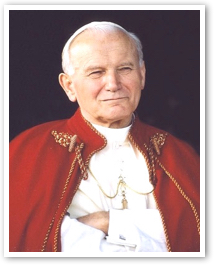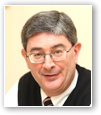St. John Paul II and the 'tyranny of the possible'
- GEORGE WEIGEL
The reputations of the great often diminish over time.
 Ten years after his holy death on April 2, 2005, Karol Wojtyla, Pope St. John Paul II, looms even larger than he did when the world figuratively gathered at his bedside a decade ago: tens of millions of men and women around the world who felt impelled, and privileged, to pray with him through what he called his "Passover" — his liberation through death into a new life of freedom in the blazing glory of the Thrice-Holy God.
Ten years after his holy death on April 2, 2005, Karol Wojtyla, Pope St. John Paul II, looms even larger than he did when the world figuratively gathered at his bedside a decade ago: tens of millions of men and women around the world who felt impelled, and privileged, to pray with him through what he called his "Passover" — his liberation through death into a new life of freedom in the blazing glory of the Thrice-Holy God.
On this anniversary, as at his canonization last year, what seems most memorable about the man, at least at this historical moment, was that he refused to accommodate to the "tyranny of the possible:" the idea that some things just can't be put right; that we're stuck with the way things are, however much we may dislike them.
There was a lot of demoralized resignation in the Church and the world when Karol Wojtyla was elected Bishop of Rome on Oct. 16, 1978. The world from San Francisco to the Ural Mountains seemed permanently divided into two hostile, ideologically opposed, nuclear-armed camps, along a fault line defined at the end of World War II. Thirteen years after the conclusion of the Second Vatican Council, the Catholic Church seemed permanently divided, too — and perhaps condemned to the fate of mainline liberal Protestantism, which (to borrow from Richard John Neuhaus) had become the oldline on its way to becoming the sideline. Robust and evangelically vibrant Catholic conviction, it seemed, had no more place in the "real world" of late modernity than did the dream of a Europe without the Berlin Wall.
Yet John Paul II, who combined mystical insight with remarkable shrewdness, refused to bow passively to the dictatorship of the inevitable. The Lord had said to the prophet, "Come, now, let us set things right" [Isaiah 1:18]: and that's exactly what the 264th Bishop of Rome proceeded to do.
He refused to believe that Vatican II, the ecumenical council he had experienced as a powerful work of the Holy Spirit, could only lead to permanent incoherence and division in Catholicism; and by providing an authoritative interpretation of the Council, John Paul II's pontificate energized the living parts of the Church and made Vatican II the launch platform for the new evangelization and the Church's rediscovery of itself as a missionary enterprise.
He refused to believe that the false ideas of the human person and human history embodied in communism could divide Europe indefinitely; and by igniting a revolution of conscience behind the iron curtain, the man the last president of the Soviet Union called "the world's greatest moral authority" became an agent of liberation for his Slavic brethren and the precursor of new possibilities in international affairs.
Yet John Paul II, who combined mystical insight with remarkable shrewdness, refused to bow passively to the dictatorship of the inevitable.
These enormous accomplishments — and their roots in John Paul's profound faith — should be remembered at this moment, when too many are tempted to despair about the state of the world and not a few are wondering about the condition of the Church.
As for the latter, those worried about another Catholic slide into incoherence should have faith in the ecclesial experience of the last three decades, which has taught enduring lessons about how Catholicism cannot merely survive, but flourish, amidst the cultural acids of post-modernity — if it holds fast to a dynamic orthodoxy lived with compassion and solidarity. John Paul II unleashed tremendous evangelical energies in the world Church — energies that embody Pope Francis' call that Catholics be a "Church in permanent mission." Those who live out that call will win the future.
As for the world, beheaded Christians, Syrian innocents slaughtered by chemical weapons, and a Russian invasion of Ukraine are stark reminders that "world order," if not maintained, will disintegrate. Those frightened by the seeming power of the wicked in the world today can take heart from what John Paul II said to young people in Cracow in June 1979: "Be afraid only of thoughtlessness and pusillanimity."
Be not afraid: his signature phrase, lived to the end, made him John Paul the Great.
 This is Meaghen Gonzalez, Editor of CERC. I hope you appreciated this piece. We curate these articles especially for believers like you.
This is Meaghen Gonzalez, Editor of CERC. I hope you appreciated this piece. We curate these articles especially for believers like you.
Please show your appreciation by making a $3 donation. CERC is entirely reader supported.

Acknowledgement
 George Weigel, "St. John Paul II and the 'tyranny of the possible'." The Catholic Difference, (Canada) March 31, 2015.
George Weigel, "St. John Paul II and the 'tyranny of the possible'." The Catholic Difference, (Canada) March 31, 2015.
Reprinted with permission of George Weigel. George Weigel's column is distributed by the Denver Catholic Register, the official newspaper of the Archdiocese of Denver. Phone: 303-715-3123.
The Author

 George Weigel is a Distinguished Senior Fellow of the Ethics and Public Policy Center in Washington, D.C. He is author of The Fragility of Order: Catholic Reflections on Turbulent Times; Lessons in Hope: My Unexpected Life with St. John Paul II; Evangelical Catholicism: Deep Reform in the 21st-Century Catholic Church; Witness to Hope: The Biography of Pope John Paul II; Roman Pilgrimage: The Station Churches; Evangelical Catholicism; The End and the Beginning: John Paul II—The Victory of Freedom, the Last Years, the Legacy; God's Choice: Pope Benedict XVI and the Future of the Catholic Church; Letters to a Young Catholic: The Art of Mentoring; The Courage to Be Catholic: Crisis, Reform, and the Future of the Church; and The Truth of Catholicism: Ten Controversies Explored.
George Weigel is a Distinguished Senior Fellow of the Ethics and Public Policy Center in Washington, D.C. He is author of The Fragility of Order: Catholic Reflections on Turbulent Times; Lessons in Hope: My Unexpected Life with St. John Paul II; Evangelical Catholicism: Deep Reform in the 21st-Century Catholic Church; Witness to Hope: The Biography of Pope John Paul II; Roman Pilgrimage: The Station Churches; Evangelical Catholicism; The End and the Beginning: John Paul II—The Victory of Freedom, the Last Years, the Legacy; God's Choice: Pope Benedict XVI and the Future of the Catholic Church; Letters to a Young Catholic: The Art of Mentoring; The Courage to Be Catholic: Crisis, Reform, and the Future of the Church; and The Truth of Catholicism: Ten Controversies Explored.




